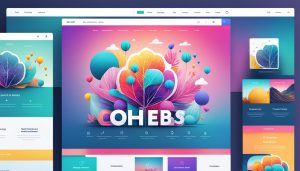What is an Informational Website and How is it Built?
Did you know that informational websites are one of the most popular types of websites on the internet today? In fact, a staggering 64% of all websites fall into this category. Whether you’re a small business owner, a non-profit organization, or a large website like Wikipedia, understanding how to build an effective informational website is key to showcasing your brand and providing valuable information to your audience.
Key Takeaways:
- An informational website focuses on sharing information with visitors and is often referred to as a brochure website.
- The design of an informational website plays a crucial role in capturing and retaining visitors’ attention.
- An effective informational website should have key features such as easy accessibility to contact details, interactive elements, and seamless navigation.
- Responsive design is essential to ensure compatibility across different devices and adapt to evolving technology.
- Building trust and retention on an informational website can be achieved through social media integration, online reviews, and regular updates.
The Importance of Design in an Informational Website
When it comes to building an effective website, the design plays a crucial role in capturing and retaining visitors’ attention. A well-designed informational website not only enhances the outward perception of the organization but also acts as an excellent sales tool. To optimize informational websites and create a visually appealing user experience, several design elements should be considered.
First and foremost, the design choices, such as color scheme, layout, and font choices, should align with the branding of the organization. Consistency in design elements throughout the website helps establish brand recognition and credibility.
Attention-grabbing banners and impactful visuals can make a strong first impression on visitors. Engaging images and videos relevant to the content can enhance the overall user experience and create an emotional connection with the audience.
Navigating through an informational website should be logical and user-friendly. Visitors should be able to easily find the information they need, whether it’s exploring the different sections of the website or searching for specific content.
An optimized design not only captivates visitors but also improves the user interface, enhancing customer interaction and satisfaction. This can lead to increased engagement, longer page views, and higher chances of achieving the desired conversion goals.
Regular updates and improvements to the design can keep the website visually appealing and user-friendly. As technology and design trends evolve, it’s essential to adapt the website’s design to meet the changing expectations of visitors and provide a seamless browsing experience across different devices. Responsive design is particularly important for optimizing informational websites, allowing them to be accessible and user-friendly on various screen sizes, including desktops, tablets, and mobile devices.
By prioritizing the importance of design in an informational website, businesses can effectively communicate their brand identity, capture visitors’ attention, and create a positive user experience that fosters trust and engagement.
Key Features of an Effective Informational Website
When creating an informational website, it is crucial to include key features that maximize its impact and effectiveness. These features are essential in ensuring a seamless user experience and attracting relevant traffic to the site. Here are some important elements to consider:
- Easily Accessible Contact Details: Provide visitors with easily accessible contact information to facilitate communication between your organization and potential customers. This can include a dedicated contact page or prominent contact details displayed on each page of the website.
- Memorable Domain Name: Choose an easy-to-remember domain name that reflects your brand and makes it simple for visitors to find your website. A clear and memorable domain name can contribute to higher website traffic and better user experience.
- Interactive Elements: Incorporate interactive elements, such as feedback forms or comment sections, to encourage two-way communication with your audience. This allows visitors to provide valuable feedback, ask questions, and engage with your organization.
- Seamless Navigation: Ensure that your website has intuitive and easy-to-use navigation menus so that visitors can explore your content effortlessly. Well-organized menus and clear information hierarchy make it easier for users to find the information they need without frustration.
- Avoid Excessive Advertisements: While advertisements can generate revenue, excessive ads can negatively impact user experience and customer retention. Balance the placement of ads on your website to maintain a clean and professional appearance.
- Quality, Structured Content: Create valuable and structured content that provides relevant information to your visitors. Well-written content not only helps users find the information they are looking for but also improves search engine optimization (SEO) and boosts organic traffic to your website.
- Dedicated SEO Strategy: Implement a targeted SEO strategy to increase the visibility of your website on search engines. This can involve optimizing meta tags, using relevant keywords, and creating high-quality backlinks to enhance your website’s ranking and attract more relevant traffic.
By incorporating these key features, you can create an effective informational website that delivers a positive user experience, effectively communicates your organization’s message, and attracts the right audience.
Check out this visually appealing example of an effective informational website:

| Benefits of Key Features | Example |
|---|---|
| Easily Accessible Contact Details | Visible contact details on the header of each page |
| Memorable Domain Name | Company name followed by a relevant keyword (e.g., mycompanyconsulting.com) |
| Interactive Elements | Feedback form at the end of each article to gather user opinions |
| Seamless Navigation | Clear and organized menu with logical categorization |
| Avoid Excessive Advertisements | Thoughtfully placed ads that do not disrupt the user experience |
| Quality, Structured Content | Thorough articles with clear headings and subheadings |
| Dedicated SEO Strategy | Optimized meta tags, keyword research, and high-quality backlinks |
Responsive Design for Informational Websites
In today’s digital landscape, having a responsive web design for informational websites is essential. With the increasing usage of mobile internet and the emergence of wearable devices, it is crucial to optimize your website’s design to ensure compatibility and provide the best user experience across different devices.
Responsive design allows your website to adapt and adjust its layout, content, and functionality based on the screen size and device used by the visitor. Whether they are viewing your website on a desktop computer, a smartphone, or even a smartwatch, responsive design ensures that the user interface remains seamless and user-friendly.
When implementing responsive design for your informational website, consider the following:
- Mobile compatibility: More and more users are accessing websites through their smartphones, so it’s important to ensure that your website is accessible and visually appealing on mobile devices. This includes optimizing font sizes, button placements, and navigation menus for a smaller screen.
- Wearable devices: As wearable technology continues to gain popularity, such as smartwatches and fitness trackers, it’s crucial to consider their compatibility with your website. Adapt your web design to provide a seamless and intuitive experience for users accessing your website on these devices.
- User interaction: Make sure to optimize your website’s design for easy interaction on portable devices. This includes optimizing touch targets, minimizing the need for scrolling, and ensuring a smooth navigation experience.
By embracing responsive design, you can future-proof your informational website and ensure its long-term success in a rapidly evolving digital landscape. It allows you to reach a wider audience, enhance user experience, and stay ahead of the competition.

Studies show that mobile users are more likely to engage and convert on websites that provide a user-friendly experience on their devices. Therefore, investing in responsive design is not just about accommodating different screen sizes; it’s about optimizing your website for improved engagement and conversion rates.
Whether your visitors are using a smartphone, tablet, or wearable device, a responsive design ensures that they can access information from your informational website with ease, leading to higher customer satisfaction and increased trust in your brand.
| Benefits of Responsive Design for Informational Websites |
|---|
| Improved user experience across devices |
| Reach a wider audience on mobile and wearable devices |
| Enhanced engagement and conversion rates |
| Foster trust and credibility with a consistently optimized design |
| Stay ahead of the competition in a mobile-first world |
Building Trust and Retention on an Informational Website
Building trust and retaining visitors is crucial for the success of an informational website. When creating an informational website, it’s important to implement strategies that enhance trustworthiness and encourage customer loyalty. Here are some steps you can take to build trust and retention:
1. Integrate and optimize links to social media handles: By linking your informational website to your social media profiles, you can enhance the trustworthiness of your brand. Including social media icons on your website allows visitors to easily find and connect with your organization on various platforms.
2. Encourage positive responses and engagement on social media: Actively interact with your audience on social media to build a sense of community and trust. Responding to comments, messages, and reviews in a timely and professional manner can go a long way in establishing trust and fostering customer loyalty.
3. Leverage online reviews and testimonials: Displaying positive reviews and testimonials from satisfied customers can provide social proof and enhance the credibility of your organization. Consider featuring these testimonials on your website to build trust and reassure visitors of your expertise and reliability.
4. Regularly update and maintain your website: Keeping your informational website up-to-date with accurate information is crucial for building trust. Outdated or incorrect information can lead to confusion and erode trust. Regularly review and update your content to ensure it remains relevant and trustworthy.
Trust-Building Strategies for an Informational Website
| Trust-Building Strategies | Description |
|---|---|
| Integrate Social Media Links | Include social media icons and optimize links to your organization’s social media profiles for increased transparency and accessibility. |
| Encourage Engagement | Interact with your audience on social media platforms, respond to comments and messages, and encourage customer participation. |
| Showcase Reviews and Testimonials | Display positive reviews and testimonials from satisfied customers to validate your organization’s credibility. |
| Regularly Update Content | Maintain accurate and up-to-date information on your website to establish trustworthiness and reliability. |
Trustworthiness and customer retention go hand in hand and significantly impact the success of an informational website. By implementing these strategies, you can build trust, forge lasting relationships with your audience, and ensure the long-term success of your informational website.
Additional Features for an Engaging Informational Website
When it comes to creating an informational website, basic content is just the starting point. To truly engage visitors and leave a lasting impression, you need to incorporate additional features that enhance the user experience.
One feature that can greatly enhance communication and boost customer satisfaction is a chat box or live chat feature. This allows visitors to receive real-time customer support and easily communicate with your organization, making their experience more interactive and personalized.
A robust search functionality is also essential for an effective informational website. Visitors should be able to find the information they need quickly and effortlessly. By providing a search bar that delivers accurate results, you can ensure that visitors don’t get frustrated and leave your site.
Privacy protection is another crucial aspect to consider when collecting personal information from visitors. It’s important to prioritize data security and implement measures that instill confidence and trust. By being transparent about your privacy practices and taking steps to protect user data, you can maintain their trust and loyalty.
Offering free tools or resources is a great way to increase website traffic and generate interest in your core business services. Whether it’s a downloadable guide, a template, or a calculator, providing valuable resources for free helps visitors see the value you provide and encourages them to explore further.
Lastly, don’t underestimate the power of multimedia. Incorporating images and videos into your informational website can engage visitors on an emotional level, making your content more memorable and impactful. Visual elements can help personalize your website and create a connection with your audience.
By implementing these additional features, you can transform your informational website into an engaging and user-friendly destination that meets the expectations of your visitors. Remember, building an effective website is a continuous process, so always strive to deliver a seamless user experience.
FAQ
What is an informational website?
How do you build an informational website?
What are the common sections on an informational website?
Why is design important in an informational website?
What are the key features of an effective informational website?
Why is responsive design important for informational websites?
How can an informational website build trust and retention?
What additional features can make an informational website more engaging?
- Shop for Server & Workstation Systems & more - February 25, 2025
- IP Geolocation API and IP Location Lookup Tools - February 24, 2025
- What is GoDaddy? Everything You Need to Know in 2024 - February 23, 2025





















Post Comment
You must be logged in to post a comment.